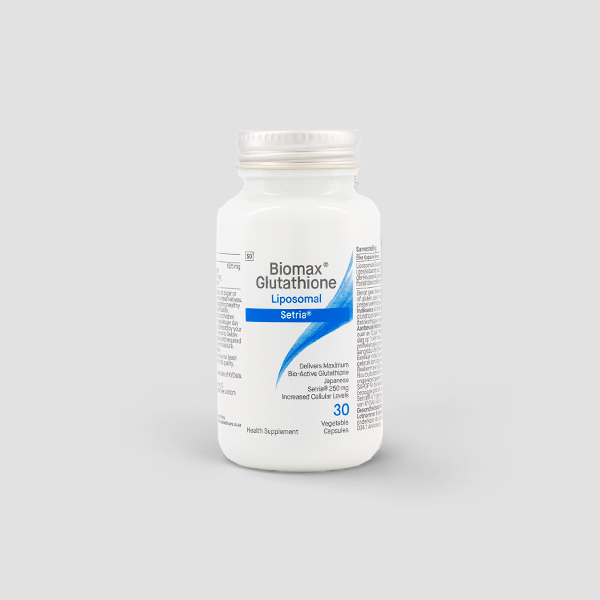A naturally occurring compound, its significance extends across various physiological processes, from immune system function and support to protecting cells from oxidative damage.
What is Glutathione?
Glutathione is a naturally occurring antioxidant found in almost every cell in the body. It is composed of three amino acids: glutamine, cysteine, and glycine. This powerful compound plays a critical role in various biological processes, and provides broad-spectrum immune support, helping to promote a healthy immune response. Furthermore, glutathione assists in protecting the body from oxidative stress and free radical damage.
What Are the Benefits of Glutathione?
Some key benefits of glutathione are:
- Detoxification: Glutathione is essential for the liver’s detoxification processes, particularly in the second phase of detoxification, where it binds with toxins to render them less harmful and more easily excretable. It helps neutralise and eliminate a wide variety of toxins, including heavy metals like mercury and lead, environmental pollutants, and byproducts of metabolism such as free radicals. This detoxification function is crucial for maintaining liver health, especially for individuals exposed to high levels of toxins through diet, pollution, or medication. [1]
- Immune Support: By boosting the immune system, glutathione helps the body fight off infections, illnesses, and even cancerous cells. It enhances the function of white blood cells, particularly lymphocytes, which play a vital role in the body’s adaptive immune response. Glutathione also helps regulate inflammation by reducing the production of pro-inflammatory cytokines, ensuring that the immune system doesn’t overreact, which could otherwise lead to chronic inflammation and autoimmune conditions.
- Cellular Health: Glutathione aids in the repair and regeneration of cells by protecting cellular components from oxidative stress. It maintains mitochondrial function, which is vital for energy production at the cellular level. Mitochondria are often referred to as the “powerhouses” of the cell, and glutathione ensures that they remain functional, thus enhancing overall energy levels and stamina. This cellular protection also supports better functioning of tissues and organs, reducing the risk of diseases linked to cellular degeneration, such as cancer and heart disease.
- Brain Health: Glutathione contributes to cognitive function by protecting brain cells, or neurons, from oxidative damage. The brain is particularly vulnerable to oxidative stress due to its high oxygen consumption and lipid content. In this way, glutathione has the potential to reduce the risk of neurodegenerative diseases like Alzheimer’s and Parkinson’s. Additionally, it plays a role in reducing neuroinflammation, which is increasingly being linked to cognitive decline, mood disorders, and various forms of dementia. [2]
The Benefits of Glutathione for Skin Health
Glutathione serves as a powerful antioxidant that protects the skin from environmental damage and oxidative stress by neutralising free radicals, which are primary contributors to premature aging and skin dullness. Environmental pollutants and UV radiation induce oxidative stress, leading to the breakdown of collagen and elastin, the proteins responsible for maintaining skin’s firmness and elasticity. By preventing this oxidative damage, glutathione helps protect the skin from premature ageing while enhancing its quality and radiance. Additionally, glutathione’s ability to inhibit tyrosinase, the enzyme involved in melanin production, makes it effective in evening out skin tone and reducing hyperpigmentation, leading to a more balanced and brighter complexion. Furthermore, glutathione supports tissue repair and regeneration, aiding in the production of collagen and elastin, which reduces the appearance of fine lines and wrinkles, ultimately improving skin’s firmness and resilience. [3]
Which Foods Contain Glutathione?
While glutathione is present in various foods, its levels can be relatively low compared to supplemental forms. However, consuming glutathione-rich foods can support the body’s ability to produce and maintain adequate levels. Some foods that contain glutathione include:
- Fruits and Vegetables: Avocados, spinach, asparagus, and broccoli are great sources of glutathione.
- Nuts and Seeds: Almonds, sunflower seeds, and walnuts provide glutathione.
- Garlic and Onions: These foods contain sulfur compounds that help boost glutathione levels.
- Whole Grains: Brown rice and whole wheat can contribute to glutathione production.
- Legumes: Beans and lentils are good sources of glutathione. [4]
How Often Should You Take Glutathione and What is the Dosage?
The frequency of glutathione supplementation can vary depending on individual needs and health goals. Generally, a typical dosage ranges from 250 to 500 mg per day. For those with specific health concerns or under medical supervision, higher doses may be recommended. It is advisable to consult a healthcare provider to determine the appropriate dosage and frequency based on individual health conditions and needs.
How Soon Will You See Results After Starting Glutathione?
The time frame for experiencing noticeable results from glutathione supplementation can vary. Some individuals may notice improvements in energy levels, skin health, or immune function within a few weeks, while others might take a few months to observe significant benefits. Factors such as the dosage, individual health status, and overall lifestyle can influence the speed and extent of the results. Consistent use and a balanced diet can help enhance the effectiveness of glutathione supplementation.
Why Choose Coyne Biomax® Glutathione Liposomal?
Coyne Biomax® Glutathione Liposomal is a master antioxidant that provides immune support and can improve overall health. Coyne Biomax® Glutathione Liposomal contains Setria®, a naturally fermented and patented Japanese form of glutathione, ensuring high quality and efficacy. Enhanced with liposome entrapment technology, this supplement offers optimal absorption and bioavailability, allowing the body to fully utilise the benefits of Glutathione. Coyne Biomax® Glutathione Liposomal provides a comprehensive solution to a range of concerns such as immune health, detoxification assistance, antioxidant protection, and overall well-being.
In conclusion, glutathione is a versatile and valuable supplement with various health benefits, including detoxification, immune support, and anti-ageing properties. Incorporating glutathione-rich foods and considering supplementation can support overall well-being and address specific health concerns. Always consult with a healthcare professional before starting any new supplement regimen.



